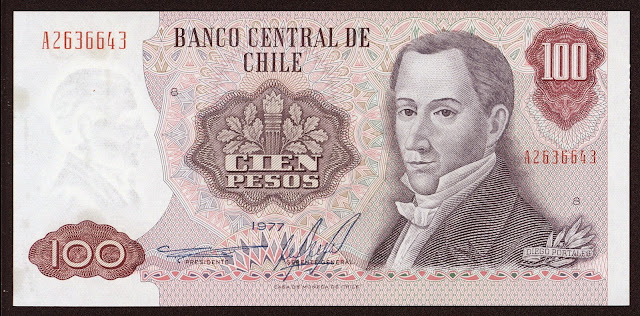Chile Banknotes 100 Pesos banknote 1977 Diego Portales
Central Bank of Chile - Banco Central de Chile
Obverse: Portrait of Diego Portales (1793 - 1837) was a Chilean statesman and entrepreneur.
Signatures: Alvaro Bardуn Muсoz & Carlos Molina Orrego.
Reverse: Meeting of Eminent Persons 1837, Painting by Pedro Leon Carmona.
Watermark: Diego Portales.
Printer: Casa de Moneda de Chile.
Chile banknotes - Chilean paper money
1975-2009
The new Chilean peso was introduced on 29 September 1975 by decree 1,123, replacing the escudo at a rate of 1 peso for 1000 escudos.
1000 Pesos 2000 Pesos 5000 Pesos 10000 Pesos
Diego Portales
Diego Portales, in full Diego José Víctor Portales (born June 26, 1793, Santiago, Viceroyalty of Peru [now in Chile] — died June 6, 1837, Valparaíso, Chile), Chilean politician and for seven years virtual dictator who was instrumental in establishing political order and instituting economic progress in Chile. Disliked by some Chileans during his lifetime, he became a symbol of Chilean unity after his death.
Born into a middle-class family, Portales amassed a small fortune early in life. In 1824 he was awarded a monopoly on tobacco, tea, and liquors that proved immensely profitable but aroused the anger of the Chilean landowners. Upon termination of the monopoly after a few years, Portales founded two newspapers to expound his authoritarian doctrines. When the Conservative Party entered office in 1830, he was, as chief minister, the real power in the land. Disdainful of political freedoms, he imprisoned his pipiolo (liberal) opponents, silenced the opposition press, and subdued the army. Portales ruled through the constitution of 1833, a document that created a centralized state dominated by the conservative oligarchy. Liberals and military leaders were barred from participation in the government.
Disturbed by increasing trade competition from Lima and the threat of a combined Peru-Bolivia confederation, Portales initiated war with the Peru-Bolivia alliance in 1836. This trade-inspired war was ultimately won by Chile, but Portales was assassinated by rebellious militaries while reviewing his troops. Nonetheless, he had set Chile on a path of political stability and economic progress.

